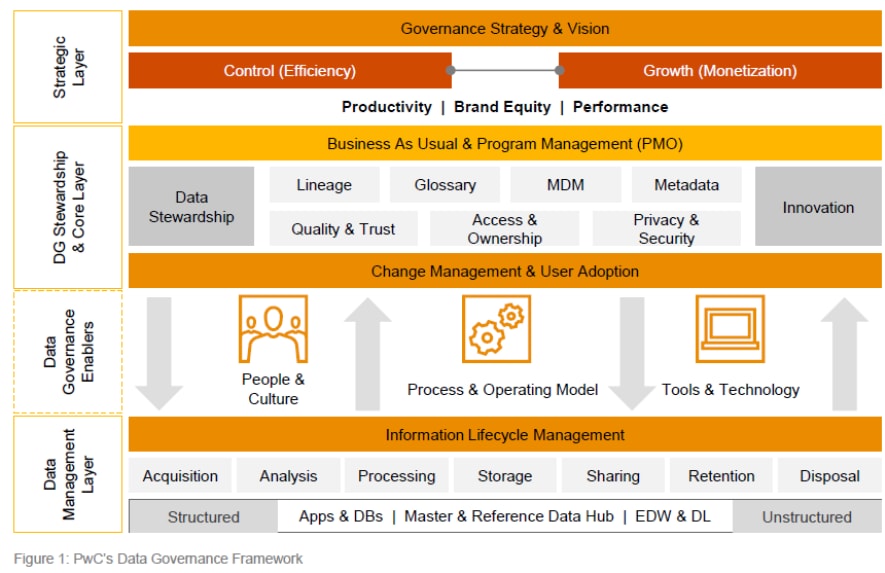
The importance of data governance
Lack of data governance has often resulted in organisations being unable to derive any tangible benefits from data, despite investing heavily across their data value chains. A data governance framework refers to the process of building a model for managing enterprise data.
A well-defined data governance framework empowers an organisation to define guidelines and rules on data management. Organisations can make informed decisions about how to manage their data assets and ensure efficient utilisation of trusted and properly governed data across value chains. Adoption of standard data governance framework also minimises data management costs such as data storage, data processing, operational cost.
In a highly-regulated business environment, it is challenging for organisations, especially in sectors like banking, financial services, healthcare to manage their data-related risk and compliance issues. So, defining a data governance framework really helps in risk management and ensures that the organisation fulfils the growing demand for compliance with regulatory, legal and state requirements on data management.
A data governance framework encompasses every part of an organisation’s data management process, down to individual technologies, databases and data models. This article unveils PwC’s holistic Data Governance Framework and its key components. The article also gives a detailed overview of how organisations can adapt this framework across various data governance areas and utilise it to create bigger data-driven programmes in the future.
PwC Enterprise Data Governance Framework
At PwC, we have taken a step further and defined enterprise data governance framework, which considers the current and next generation data landscapes and upcoming data governance challenges.

PwC’s Data Governance Framework is divided into the following components:
Other global industry frameworks
Across industries, data governance has been a crtical focus area for many organisations. For some, it is necessary to adapt data governance measures because of continous introduction of new data regulations and compliances. For others, its implementation is required to achieve better control and management of their data assets. Organisations look for defined frameworks with templates and guidelines when they are looking to begin with data governance. There are multiple data governance frameworks available but some of the leading and most widely used global data governance frameworks are shown below.
DAMADMBOK (Data Management Body of Knowledge)
CMMI(Capability Maturity Assessment Model)
EDM Council- DCAM (Data Capability Assessment Model)
ARMA(Information Governance Maturity Model)
Stanford Maturity Model
These frameworks are standard and used globally. Though popular, these frameworks restrict their expertise to data governance as an enabler or focus on any one of the key areas to be considered during any data management or other data-focused programmes, instead of addressing the key challenges of data governance and their solutions.
PwC’s Data Governance Framework has been built after carefully considering all the other industry-led global governance frameworks. It covers all the critical areas of data governance an organisation needs to take care of. It is comprehensive and ensures that each and every layer of data ecosystem in an organisation is looked into. The framework also suggests best practices and guidelines with respect to data governance.
Conclusion
To become data-driven, organisations need to assess their current data-related challenges, identify gaps in data utilisation and prioritise key focus areas, all of which need to be covered as part of data governance initiative. Companies should shortlist the best-suited data governance framework that covers all the key areas in scope, such as data privacy, data access, metadata management. Once a suitable framework is selected, organisations should kick-start the execution process by aligning defined framework components as per their structure and data utilisation landscape. To ensure success in data governance, it is also important to establish interim checkpoints and make sure that the organisation is moving towards its set governance objectives.
Acknowledgments: This article has been researched and authored by Ambrish Anand and Prakash Suman.













